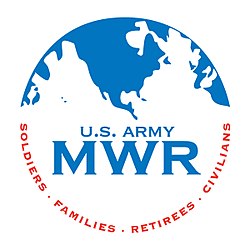| Family and MWR Programs | |
|---|---|
 Soldiers, Families, Retirees, Civilians | |
| Active | 2011 – present |
| Country | |
| Allegiance | United States |
| Branch | United States Army |
| Part of | Department of Defense Installation Management Command |
| Nickname(s) | MWR |
| Website | Official MWR News |
The United States Army's Family and Morale, Welfare and Recreation (MWR) Programs are executed within the Installation Management Command G9, Family and MWR Directorate,[1] following the deactivation of the Family and Morale, Welfare and Recreation Command on 3 June 2011 in a ceremony at Fort Sam Houston.[2] According to the organization's official mission statement, IMCOM G9 delivers "quality Family and Morale, Welfare, and Recreation programs and services supporting the readiness and resilience of the All-Volunteer Army."[3]
According to U.S. Army Regulation 215-1, Army MWR is a quality-of-life program that directly supports readiness by providing a variety of community, soldier, and family support programs, activities and services. Included in MWR are social, fitness, recreational, educational, and other programs and activities that enhance community life, foster soldier and unit readiness, promote mental and physical fitness, and generally provide a working and living environment that attracts and retains quality for U.S. Army soldiers, family members, retirees and its civilian workforce.[4]
The range of MWR programs offered at Army Garrison's is based on the needs of authorized patrons who work and reside there. Programs are managed by garrison commanders within the framework of authorized and available appropriated and non-appropriated funds. Non-appropriated funds are those funds that are locally generated by MWR programs or provided by Installation Management Command (IMCOM) region directors and/or the Family and MWR Programs. AAFES dividends are also a source of non-appropriated funding.[4]
Each MWR program is classified by category. Categories are determined by their effect on the military mission and their ability to generate revenue.[4]
- ^ "webpage". Retrieved 13 December 2012.
- ^ Archived 8 May 2011 at the Wayback Machine
- ^ "Family and MWR Mission and Vision". Retrieved 13 December 2012.
- ^ a b c "Army Regulation 215-1" (PDF). Retrieved 13 December 2012.